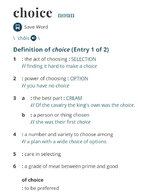Jarhyn
Wizard
- Joined
- Mar 29, 2010
- Messages
- 17,647
- Gender
- Androgyne; they/them
- Basic Beliefs
- Natural Philosophy, Game Theoretic Ethicist
Man, I'm getting flashbacks from Ion again.Presented with a formalized modal argument, DBT does not address the argument itself, but rather goes a-Googling in search of someone, anyone, who will attack modal logic itself! And sure enough he succeeds; the internet is gravid with crackpots.
This tells me that DBT can’t address the argument — otherwise, he would — and that he can’t rebut modal logic, because if he could, he would do it himself, rather than seeking someone to do it for him.
Typical ad homs and dismissal of opposing ideas.
Never mind your own googling. Never mind that you ignore anything that doesn't suit your belief in compatibilism.
Namely, that brain state is not chosen, yet it is brain state that determines what is thought, felt and done.
It is not philosophy or modal logic that falsifies the notion of free will, but neuroscience and physics.
What ad hom? Where did I ad hom you?
I simply pointed out that I presented you with a formal modal argument and you did not address it. That is the truth, isn’t it? No ad hom there.
My own googling? Of course I google up stuff to supprt and supplement arguments that I make in my own words. You do something quite different. You google up stuff in lieu of making an argument of your own. I am afraid you are the google champ, not I.
I presented you with a formal modal argument and you did not address it. Instead, you google up someone who does not address the argument either, but instead makes some generalized and frankly incoherent attack on modal logic, which means he is attacking logic itself. Good luck with that.
If you have a beef with modal logic, why don’t you state that beef in your own words. If you disagree with the formal modal argument I presented, why don’t you list the objections to the argument in your own words?
People really need to read The Socratic Dialogues and The Allegory of the Cave

